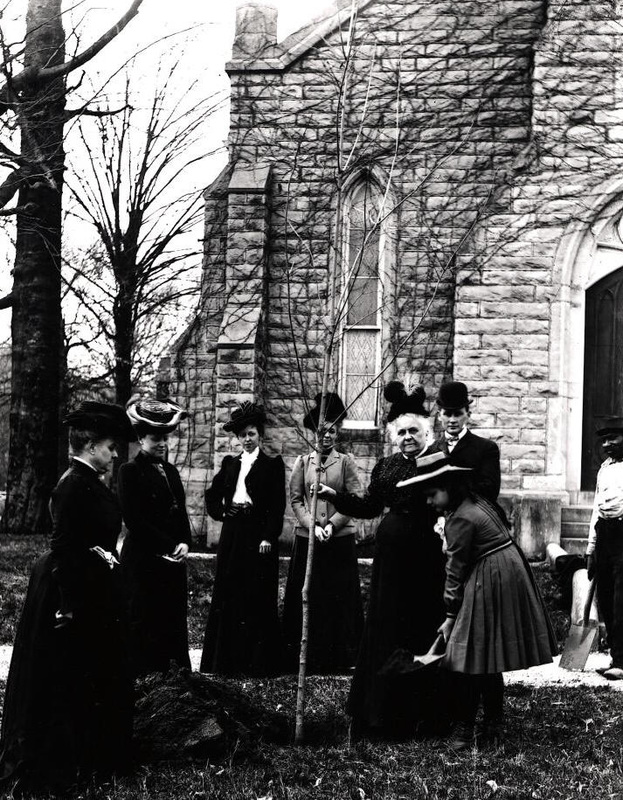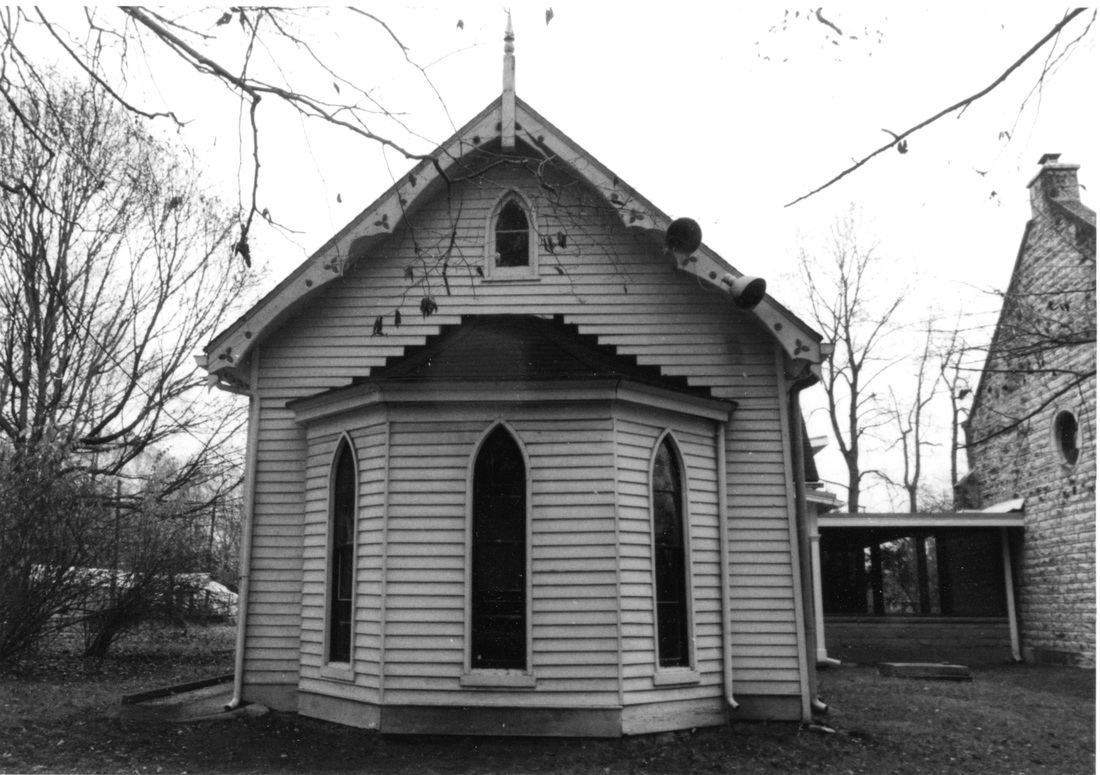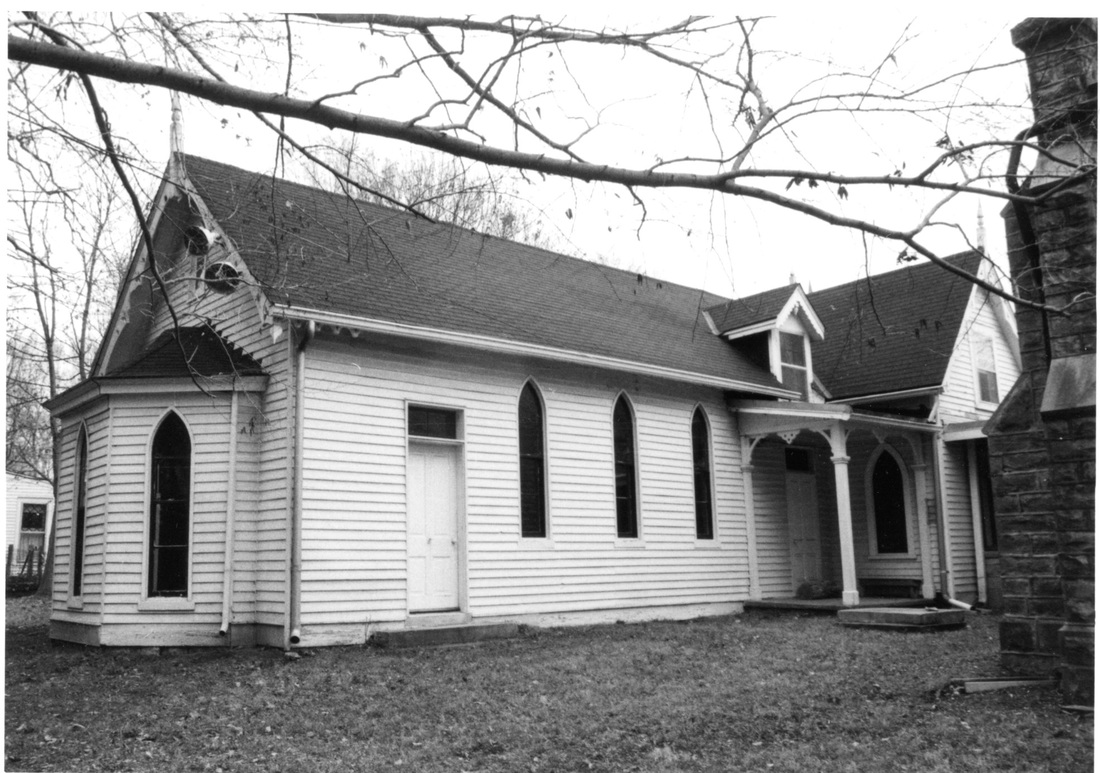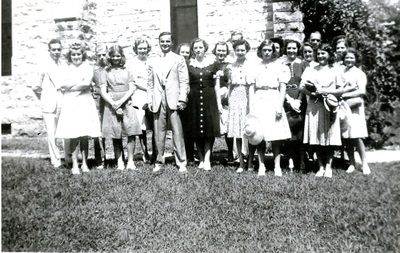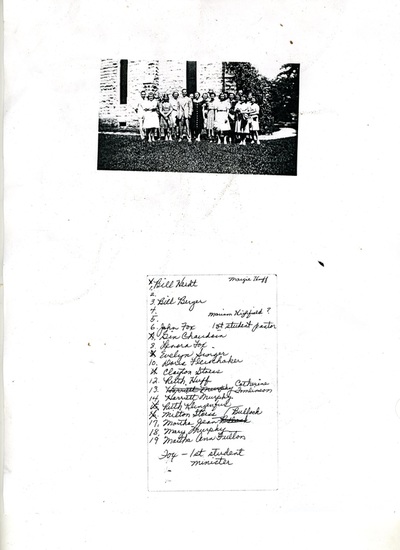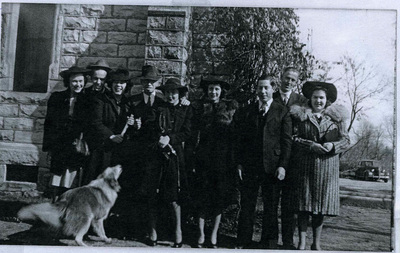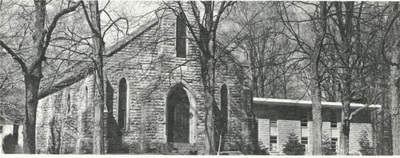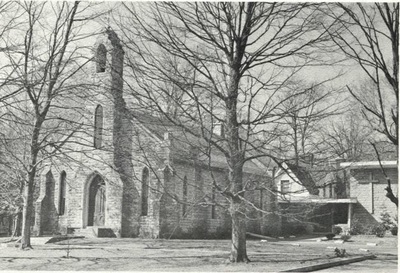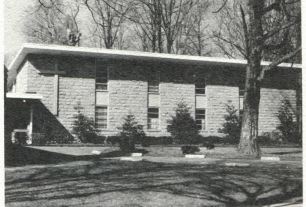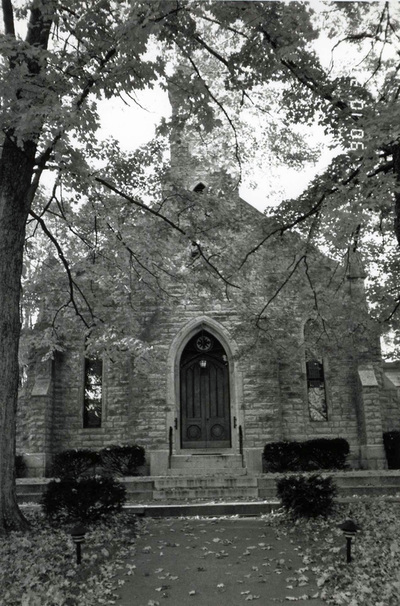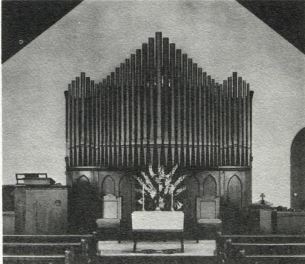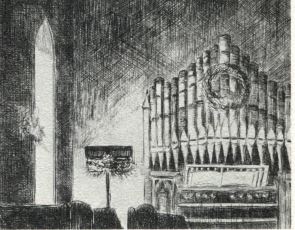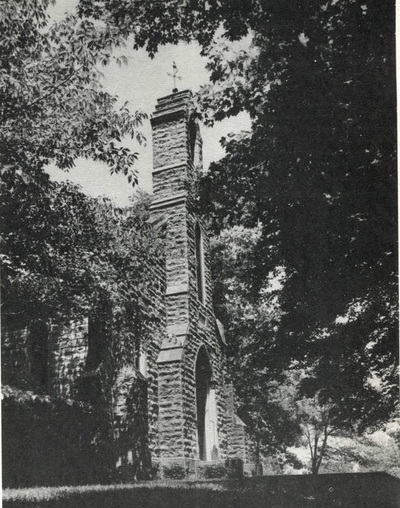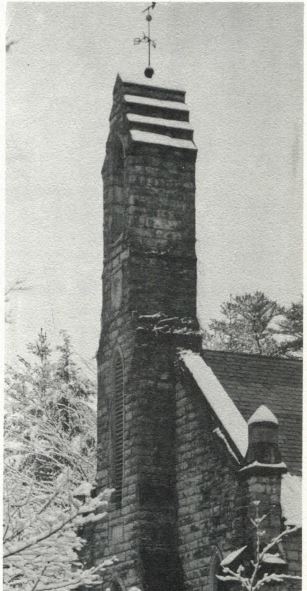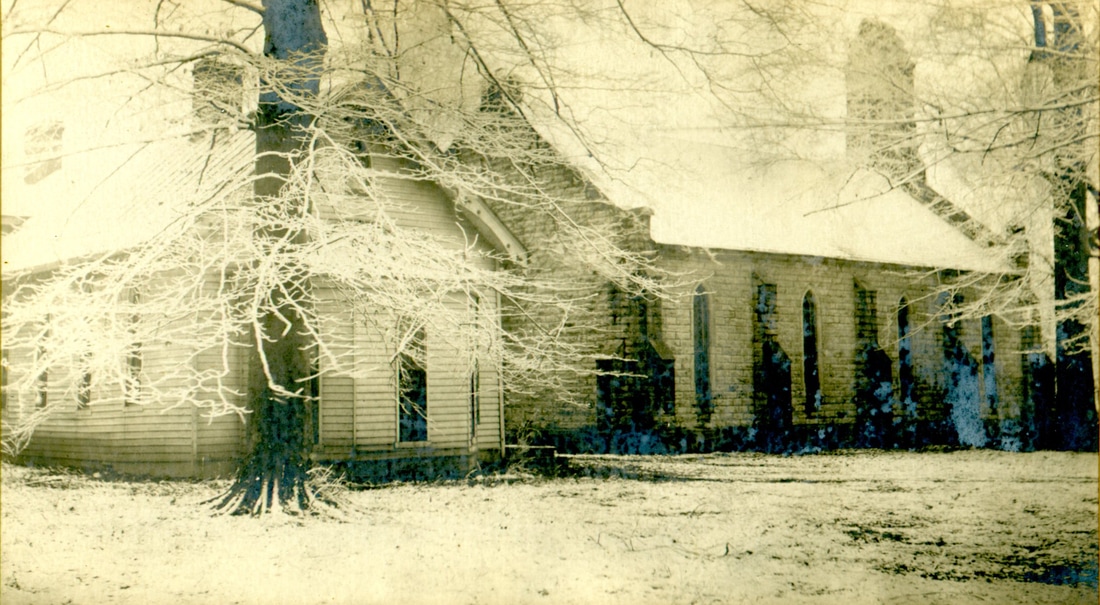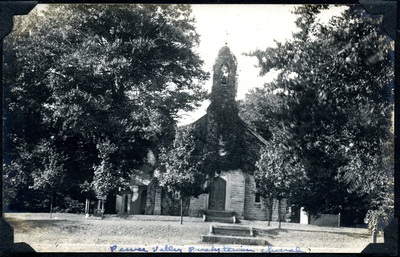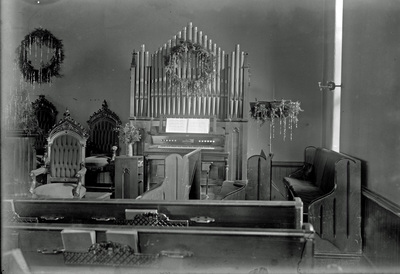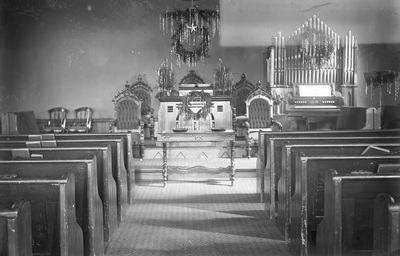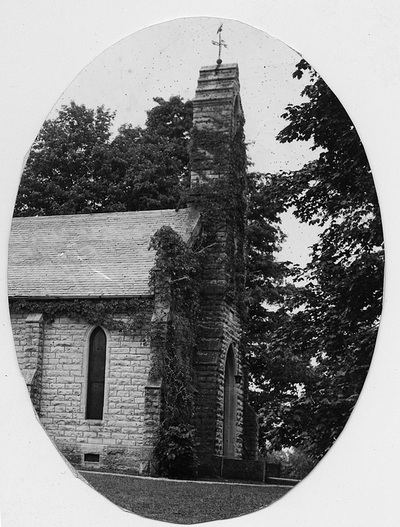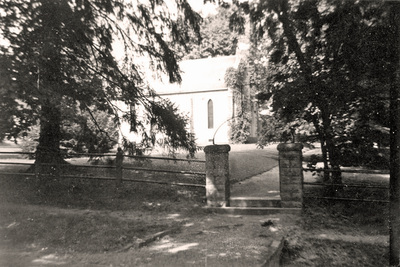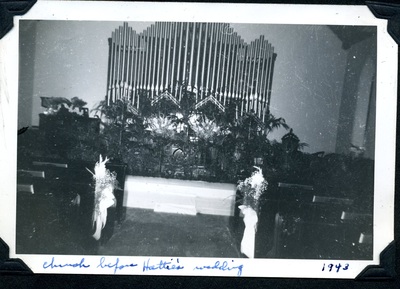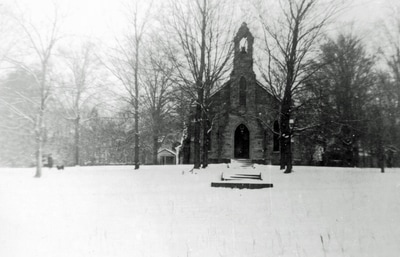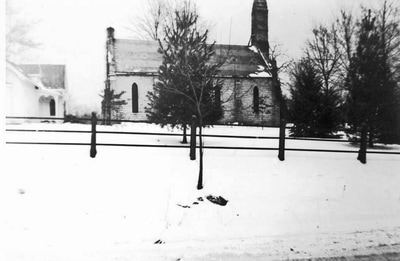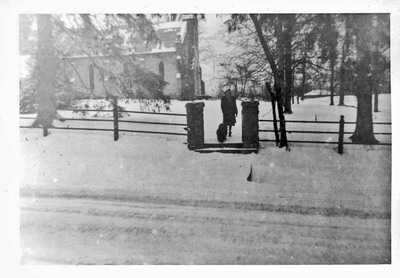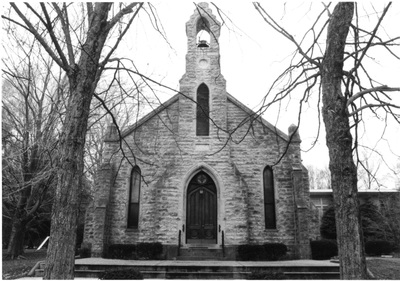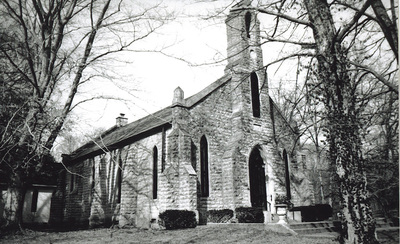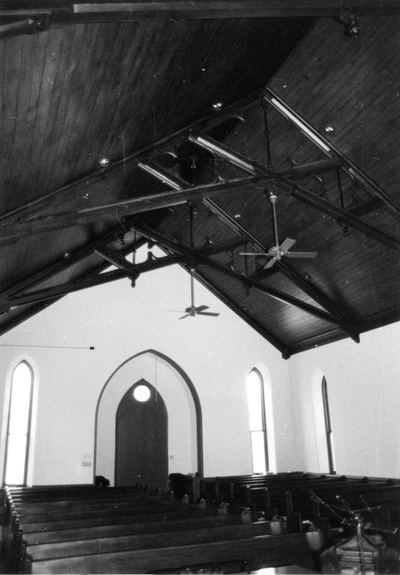Pewee Valley Presbyterian Church
|
|
The Pewee Valley Presbyterian Church was formed in November 1866 by Pewee Valley residents working with a committee from the Presbytery of Louisville. Founding members included Alexander and Annie Craig of Edgewood; Mr. and Mrs. Jonas H. Rhorer of the Locust; Charles B. Cotton and his wife, Jennie Gallagher; Thomas Barclay of Tanglewood (son-in-law of the Rhorers); and Miss Jennie Mitchell.
The property on which the church stands was formerly owned by real estate speculator Charles B. Cotton, who later deeded it to the church’s trustees. While the stone sanctuary was under construction, the congregation met in a former wooden school house already on the property. That building, which still stands, was used as a manse from 1884 to 1904 and later as a parish hall. On November 21, 1867, Dr. Burr Hamilton McCown preached the dedicatory sermon in the new sanctuary. A graduate of St. Joseph’s College in Bardstown and a former minister of the Methodist Episcopal Church, Dr. McCown was residing in Anchorage at the time, where he ran a military school for young men known as Forest Academy. He was founding member Annie Craig’s father. Membership was open to both African-Americans and whites, and interestingly, the first person to join the church after its founding was a black woman named Aunt Clary Gordon. |
Early Pastors of the Church
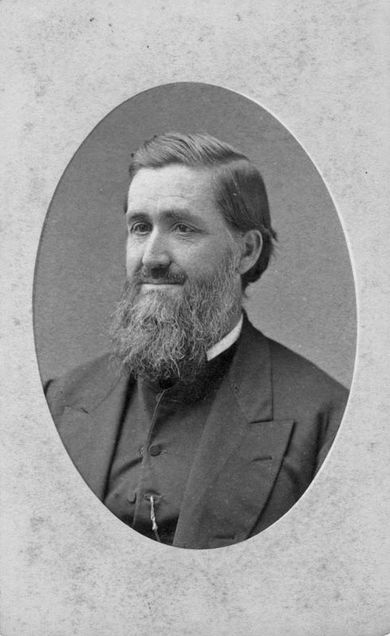 Rev. John L. McKee was Pewee Valley Presbyterian's first pastor.
Rev. John L. McKee was Pewee Valley Presbyterian's first pastor.
1871-1872 Rev. John Lapsley McKee
Gerrard County native Rev. John L. McKee attended Princeton Theological Seminary from 1851-52 and completed his Doctor of Divinity at Danville Seminary, Centre College, Danville, Ky., where he was ordained in 1856. In 1859, he became the pastor of the Chestnut Street Presbyterian Church in Louisville, a position he held through 1870. He was on the Presbytery of Louisville’s committee that worked with Pewee Valley residents on starting a church and ended up serving as its first full-time pastor from 1871-72. He served on the Board of Visitors for the Louisville School for the Blind from 1864-67 and after leaving Pewee Valley, taught at Centre College. In 1872, he was made Vice President and Professor of Moral Philosophy at the college, a position he held until 1897. Shortly after being made Vice President, Rev. McKee raised the funds necessary to keep the college solvent, after $60,000 in bonds – about two-thirds of its endowment at the time -- were stolen from the vaults of the Falls City Tobacco Bank of Louisville on March 10, 1873. According to reports, “When Dr. McKee, its vice president, announced (Centre College’s) condition to his congregation, at Danville, $6,000 was raised in its behalf in a very short while, and $6,000 more was subscribed in the vicinity in the next few days. Largely through the efforts of Dr. McKee subscriptions and promised legacies, amounting to more than $100,000, were soon secured, and, as all but about $20,000 of the stolen bonds were ultimately recovered, the institution was really placed in a much better financial condition than before…” Rev. McKee was among the six Pewee Valley men who donated the money to build the town’s train depot. His Pewee Valley home is still standing at 220 Central Avenue. He was married to Sarah H. Speke of Boyle County, Ky. in 1850.
1872-1873 Dr. N. F. Dick
1873-1877 Rev. W.R. Brown
The Rev. W. R. Brown was born in Versailles, Kentucky, received his A. B. degree from Centre College in 1862 and a D. D. Degree from Hanover College in 1883. He attended Danville Theological Seminary and was ordained in 1865. He held pastorates at Georgetown, Kentucky and Leavenworth, Kansas before coming to Pewee Valley to serve as pastor from 1873 to 1877. After this he served churches at Lake Forrest, Illinois and Madison, Indiana.
1877-1878 Rev. W.K. Archibald
1880-1883 Rev. S.E. Barr
The Rev. S. E. Barr was born in Wooster, Ohio in 1824, attended Hanover College, Hanover, Indiana, and was ordained in Madison, Indiana, in 1852. He held pastorates at Livonia, Hopewell, and Charlestown, Indiana, was stated supply at Elkhart, Utica, Vernon, and Brownstown, Indiana. He was pastor of the Pewee Valley church from 1880-1883. His wife died while he was serving in Pewee Valley, and her obituary ran in the December 17, 1881 Courier-Journal:
DEATH OF MRS. MARY H.S. BARR-- We regret to have to chronicle the death, yesterday morning, at Pewee Valley, of Mrs. Mary H.S. Barr, wife of the Rev. S.E. Barr, pastor of the Presbyterian Church in Pewee Valley, and only sister of Prof. Noble Butler, Judge J.H. Butler, and Dr. C.H. Butler. She was a woman of unusual mental power and a high degree of cultivation. Her moral character was of the noblest. She looked down with contempt upon every thing little or mean. She showed in her whole life how noble a thing woman can be. While in good health, she was of great assistance to her husband in his Christian labors. Her loss is irreparable to her husband and the other members of her family, and to all her friends. Her long illness did not impair the powers of her mind, which was unclouded to the end.
Rev. Barr retired from the ministry in 1890 and lived in Hanover, Indiana until his death in 1905.
1883-1885 Rev. F.M. Hopkins
1885-1886 Rev. J.F. Reynard
The Rev. John H . Reynard was born in Cincinnati, Ohio, attended Beloit College in Wisconsin and received his B. A. degree i n 1873. He was ordained in 1876 and was pastor of churches at Nelson, Grand Island, and Central City in Nebraska; at Fair Play, Alma, Golden, and Silver Cliff in Colorado; and Bowling Green and Pewee Valley in Kentucky.
1886-1892 Dr. Thomas Horace Cleland
Dr. Thomas Horace Cleland was born Dec. 19, 1816 in Mercer County, Kentucky. When he was sixteen, he joined the Presbyterian Church of New Providence, Kentucky. He was graduated from Centre College in 1838. After spending two years in Lane Theological Seminary, he entered Princeton in 1840 for his third year. He was ordained at Grier's Creek, Kentucky, on November 12, 1841. He taught in the high school in Lebanon, Kentucky and was stated supply at Bethel and Lebanon, Kentucky. During the years 1884 and 1885 he did work as an evangelist in Kansas and Kentucky. He was pastor of the Pewee Valley Presbyterian Church from 1885 until his death in 1892. He received an honorary degree of D.D. from Hanover College, Indiana.
Dr. Cleland’s wife, son and daughter remained in Pewee Valley after his death and were very active in the church. His wife, Louise Cleland, taught the Sunday School Primary Class for 42 years, until she became ill in 1927. According to a church history, his daughter, Mary T. Cleland, “…. exerted an influence for good in the church and community. It was through her benevolence and generosity that the Manse on Maple Avenue came to the church. She gave encouragement and support to the young ministers who served the church. She kept a kindly eye on the young people of the church and was an influence for good in them. Her life has had a lasting effect on the life of her beloved church.”
1873-1877 Rev. W.R. Brown
The Rev. W. R. Brown was born in Versailles, Kentucky, received his A. B. degree from Centre College in 1862 and a D. D. Degree from Hanover College in 1883. He attended Danville Theological Seminary and was ordained in 1865. He held pastorates at Georgetown, Kentucky and Leavenworth, Kansas before coming to Pewee Valley to serve as pastor from 1873 to 1877. After this he served churches at Lake Forrest, Illinois and Madison, Indiana.
1877-1878 Rev. W.K. Archibald
1880-1883 Rev. S.E. Barr
The Rev. S. E. Barr was born in Wooster, Ohio in 1824, attended Hanover College, Hanover, Indiana, and was ordained in Madison, Indiana, in 1852. He held pastorates at Livonia, Hopewell, and Charlestown, Indiana, was stated supply at Elkhart, Utica, Vernon, and Brownstown, Indiana. He was pastor of the Pewee Valley church from 1880-1883. His wife died while he was serving in Pewee Valley, and her obituary ran in the December 17, 1881 Courier-Journal:
DEATH OF MRS. MARY H.S. BARR-- We regret to have to chronicle the death, yesterday morning, at Pewee Valley, of Mrs. Mary H.S. Barr, wife of the Rev. S.E. Barr, pastor of the Presbyterian Church in Pewee Valley, and only sister of Prof. Noble Butler, Judge J.H. Butler, and Dr. C.H. Butler. She was a woman of unusual mental power and a high degree of cultivation. Her moral character was of the noblest. She looked down with contempt upon every thing little or mean. She showed in her whole life how noble a thing woman can be. While in good health, she was of great assistance to her husband in his Christian labors. Her loss is irreparable to her husband and the other members of her family, and to all her friends. Her long illness did not impair the powers of her mind, which was unclouded to the end.
Rev. Barr retired from the ministry in 1890 and lived in Hanover, Indiana until his death in 1905.
1883-1885 Rev. F.M. Hopkins
1885-1886 Rev. J.F. Reynard
The Rev. John H . Reynard was born in Cincinnati, Ohio, attended Beloit College in Wisconsin and received his B. A. degree i n 1873. He was ordained in 1876 and was pastor of churches at Nelson, Grand Island, and Central City in Nebraska; at Fair Play, Alma, Golden, and Silver Cliff in Colorado; and Bowling Green and Pewee Valley in Kentucky.
1886-1892 Dr. Thomas Horace Cleland
Dr. Thomas Horace Cleland was born Dec. 19, 1816 in Mercer County, Kentucky. When he was sixteen, he joined the Presbyterian Church of New Providence, Kentucky. He was graduated from Centre College in 1838. After spending two years in Lane Theological Seminary, he entered Princeton in 1840 for his third year. He was ordained at Grier's Creek, Kentucky, on November 12, 1841. He taught in the high school in Lebanon, Kentucky and was stated supply at Bethel and Lebanon, Kentucky. During the years 1884 and 1885 he did work as an evangelist in Kansas and Kentucky. He was pastor of the Pewee Valley Presbyterian Church from 1885 until his death in 1892. He received an honorary degree of D.D. from Hanover College, Indiana.
Dr. Cleland’s wife, son and daughter remained in Pewee Valley after his death and were very active in the church. His wife, Louise Cleland, taught the Sunday School Primary Class for 42 years, until she became ill in 1927. According to a church history, his daughter, Mary T. Cleland, “…. exerted an influence for good in the church and community. It was through her benevolence and generosity that the Manse on Maple Avenue came to the church. She gave encouragement and support to the young ministers who served the church. She kept a kindly eye on the young people of the church and was an influence for good in them. Her life has had a lasting effect on the life of her beloved church.”
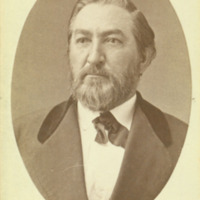 Rev. James C. Randolph was pastor from 1892-1899
Rev. James C. Randolph was pastor from 1892-1899
1892-1899 The Rev. James Curry Randolph
The Rev. J.C. Randolph was born in Mercer County, Kentucky in 1830. He graduated from Centre College in 1852 as valedictorian of his class. He taught at Stanford and Nicholasville, Kentucky. He was the first student to matriculate in the Danville Theological Seminary, where he was graduated in 1856. After the Civil War, he was elected to chair of mathematics in Centre, which he held for nearly twenty years. At the same time, he was pastor of the church at Lancaster, Kentucky. He served the Presbyterian Church in Shelbyville, Kentucky, for a short time before he was called to the Pewee Valley Church in 1892. He preached there until failing health compelled him to give up his work in 1899. He died in 1902.
1900-1907 The Rev. Cyrus Murry Creighton
The Rev. Cyrus Murry Creighton was born in 1873, was graduated from Park College in 1897 and the Presbyterian Theological Seminary in Chicago in 1900. Park College gave him an honorary D.D. degree, and after his ordination in 1900, he held pastorates in Pewee Valley, Kentucky (1900-1907) Ypsilanti, Michigan (1907-1911) and Newark, New York (1913-1926). He died in 1926.
The Rev. J.C. Randolph was born in Mercer County, Kentucky in 1830. He graduated from Centre College in 1852 as valedictorian of his class. He taught at Stanford and Nicholasville, Kentucky. He was the first student to matriculate in the Danville Theological Seminary, where he was graduated in 1856. After the Civil War, he was elected to chair of mathematics in Centre, which he held for nearly twenty years. At the same time, he was pastor of the church at Lancaster, Kentucky. He served the Presbyterian Church in Shelbyville, Kentucky, for a short time before he was called to the Pewee Valley Church in 1892. He preached there until failing health compelled him to give up his work in 1899. He died in 1902.
1900-1907 The Rev. Cyrus Murry Creighton
The Rev. Cyrus Murry Creighton was born in 1873, was graduated from Park College in 1897 and the Presbyterian Theological Seminary in Chicago in 1900. Park College gave him an honorary D.D. degree, and after his ordination in 1900, he held pastorates in Pewee Valley, Kentucky (1900-1907) Ypsilanti, Michigan (1907-1911) and Newark, New York (1913-1926). He died in 1926.
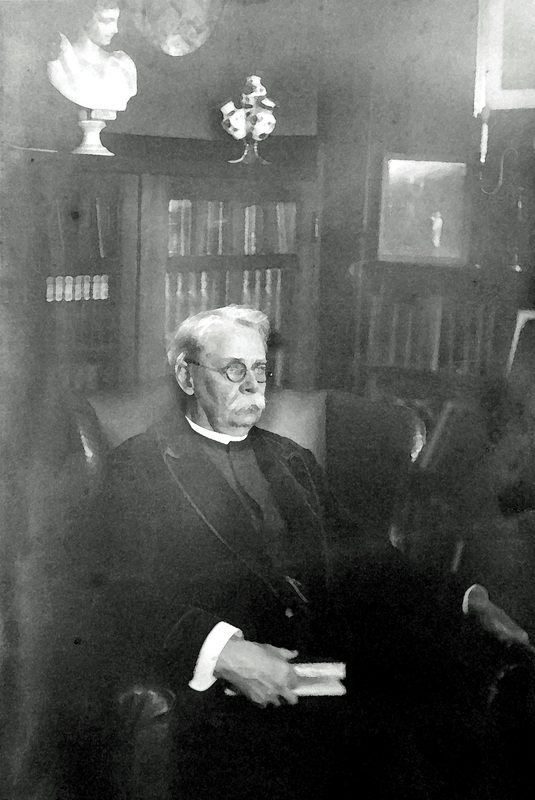 Rev. Peyton Harrison Hoge, courtesy of his great-great grandson and namesake, Petyon Hoge.
Rev. Peyton Harrison Hoge, courtesy of his great-great grandson and namesake, Petyon Hoge.
1907-1929 Dr. Peyton Harrison Hoge, D.D.
Dr. Peyton H. Hoge, Pastor and Pastor Emeritus of Pewee Valley Church from 1907-1929, was born on January 6, 1854 at Hampden Sidney, Virginia. He worked his way through Hamden Sidney College and the Theological Seminary at Richmond Virginia. He was ordained and installed as pastor of Grace Mission, which is now the Grace Covenant Presbyterian Church of Richmond, Virginia. In 1884 he was called to succeed Dr. Joseph R. Wilson, father of Woodrow Wilson, as pastor of the First Presbyterian Church at Wilmington, North Carolina. In 1899 he was called to the Warren Memorial Presbyterian Church (formerly at Fourth and Broadway, Louisville Kentucky) and in 1907, was called to Pewee Valley.
As a member of the Board of Trustees of the Louisville Presbyterian Seminary, he was chairman of the building and fund raising committee and was responsible for planning and building the Quadrangle at First and Broadway. A Homiletics class room in the Caldwell Chapel of the new Seminary is dedicated to his memory.
In addition to his duties at the church and for the seminary board, the Rev. Hoge conducted services at L.Z. Duke Hall for the inmates of the Kentucky Confederate Home every third Sunday and taught Latin to the pupils at the Villa Ridge School. His Pewee Valley home was Bemersyde.
Dr. Peyton H. Hoge, Pastor and Pastor Emeritus of Pewee Valley Church from 1907-1929, was born on January 6, 1854 at Hampden Sidney, Virginia. He worked his way through Hamden Sidney College and the Theological Seminary at Richmond Virginia. He was ordained and installed as pastor of Grace Mission, which is now the Grace Covenant Presbyterian Church of Richmond, Virginia. In 1884 he was called to succeed Dr. Joseph R. Wilson, father of Woodrow Wilson, as pastor of the First Presbyterian Church at Wilmington, North Carolina. In 1899 he was called to the Warren Memorial Presbyterian Church (formerly at Fourth and Broadway, Louisville Kentucky) and in 1907, was called to Pewee Valley.
As a member of the Board of Trustees of the Louisville Presbyterian Seminary, he was chairman of the building and fund raising committee and was responsible for planning and building the Quadrangle at First and Broadway. A Homiletics class room in the Caldwell Chapel of the new Seminary is dedicated to his memory.
In addition to his duties at the church and for the seminary board, the Rev. Hoge conducted services at L.Z. Duke Hall for the inmates of the Kentucky Confederate Home every third Sunday and taught Latin to the pupils at the Villa Ridge School. His Pewee Valley home was Bemersyde.
Sunday School Class Pictures
Role in the “Little Colonel” Stories
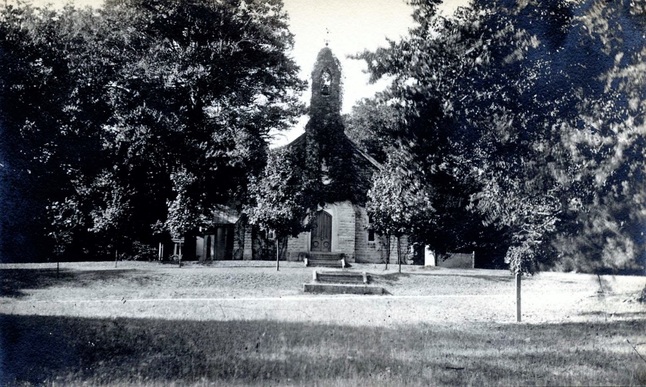 This Kate Matthews photo from the Fox Film Movie Scrapbook shows what the church looked like when Annie Fellows Johnston described it "as the little stone church with its ivy-covered belfry."
This Kate Matthews photo from the Fox Film Movie Scrapbook shows what the church looked like when Annie Fellows Johnston described it "as the little stone church with its ivy-covered belfry."
“Little Colonel” fans will recognize the Pewee Valley Presbyterian Church as the “the little stone church with its ivy-covered belfry” that served as the setting for some of the scenes in the novels. It was where the Little Colonel regularly attended church and, more importantly, where she married Rob Moore in “The Little Colonel’s Knight Comes Riding.”
In real life, many of the models Annie Fellows Johnston used for characters in the novels were members, including:
· Judge Peter Brown Muir (Judge Moore in the series), who served as a Sunday school teacher;
· Fannie Craig (schoolteacher Miss Allison in the series), who taught Sunday school, was the church’s librarian and for many years played the organ at Sunday services;
· Annie Craig (Mrs. McIntrye in the series), Fannie’s mother and the congregation’s oldest member when she died in 1914;
· Mary Craig Lawton and her children, Manly, Frances, Katherine and Louise (the Walton family in the series)
· Kate Matthews (photographer Katherine Marks in the series). Kate and her brother, E.H. Matthews, served as Sunday school teachers and E.H. also served as Sunday school superintendent for many years. In addition, E.H. accompanied the choir with his violin and Kate served as treasurer for the church’s women’s organization for 60 years;
· Louise Cleland (neighbor Mrs. Bisbee and also Mrs. Clelling, a teacher at Lloydsborough Seminary), wife of the Rev. T.H. Cleland and a Sunday school teacher for 42 years.
Annie Fellows Johnston attended the Pewee Valley Presbyterian Church while she was visiting and later became a member herself, after moving to The Beeches. The pew she sat in with her stepdaughter, Mary, is marked with a small plaque.
According to the memoirs of Cary Hoge, the Rev. Peyton H. Hoge’s daughter:
Rev. Hoge “…prevailed on Mrs. Johnston to teach a class of girls on Sunday -- not exactly Sunday School, as we were getting into our teens, but helping to make the Bible come alive for us, and hopefully prepare us to learn to teach Sunday School when we were a little older. Studying under her was an experience I wish every young person could have. She made everything so vivid and put in little touches of humor which made the lessons stick. She drew a delightful word picture of Joseph and his brothers falling on each other's necks and weeping when Joseph was made known to them, their false beards getting all askew.”
“Little Colonel” fans will recognize the Pewee Valley Presbyterian Church as the “the little stone church with its ivy-covered belfry” that served as the setting for some of the scenes in the novels. It was where the Little Colonel regularly attended church and, more importantly, where she married Rob Moore in “The Little Colonel’s Knight Comes Riding.”
In real life, many of the models Annie Fellows Johnston used for characters in the novels were members, including:
· Judge Peter Brown Muir (Judge Moore in the series), who served as a Sunday school teacher;
· Fannie Craig (schoolteacher Miss Allison in the series), who taught Sunday school, was the church’s librarian and for many years played the organ at Sunday services;
· Annie Craig (Mrs. McIntrye in the series), Fannie’s mother and the congregation’s oldest member when she died in 1914;
· Mary Craig Lawton and her children, Manly, Frances, Katherine and Louise (the Walton family in the series)
· Kate Matthews (photographer Katherine Marks in the series). Kate and her brother, E.H. Matthews, served as Sunday school teachers and E.H. also served as Sunday school superintendent for many years. In addition, E.H. accompanied the choir with his violin and Kate served as treasurer for the church’s women’s organization for 60 years;
· Louise Cleland (neighbor Mrs. Bisbee and also Mrs. Clelling, a teacher at Lloydsborough Seminary), wife of the Rev. T.H. Cleland and a Sunday school teacher for 42 years.
Annie Fellows Johnston attended the Pewee Valley Presbyterian Church while she was visiting and later became a member herself, after moving to The Beeches. The pew she sat in with her stepdaughter, Mary, is marked with a small plaque.
According to the memoirs of Cary Hoge, the Rev. Peyton H. Hoge’s daughter:
Rev. Hoge “…prevailed on Mrs. Johnston to teach a class of girls on Sunday -- not exactly Sunday School, as we were getting into our teens, but helping to make the Bible come alive for us, and hopefully prepare us to learn to teach Sunday School when we were a little older. Studying under her was an experience I wish every young person could have. She made everything so vivid and put in little touches of humor which made the lessons stick. She drew a delightful word picture of Joseph and his brothers falling on each other's necks and weeping when Joseph was made known to them, their false beards getting all askew.”
The United Presbyterian Church in Pewee Valley 1866-1966 100th Anniversary Photos
Annie drew inspiration for her stories not only from the church’s membership, but also from the women’s organization, which started as the Busy Bees in 1888, merged into the King’s Daughters and became the Ladies Aid Society in 1909. Both the Busy Bees and the King’s Daughters are mentioned in the series.
Descriptions of some of the real-life fundraising activities and the fundraisers from “The United Presbyterian Church in Pewee Valley 1866-1966 100th Anniversary” booklet are below:
"Money was raised by the sale of the Little Colonel post cards, suppers, food sales, bazaars, movies, rummage sales, ice cream fetes, valentine parties, Easter festivals, Dr. Cotton's annual suppers for his students, white elephant sales, cafeteria suppers, colonial teas, silver teas, traveling baskets, and sums made individually by the turn-over of a fifty cent piece and later on a quarter."
"All the prominent members of the Presbyterian Church were always willing to work. The names of all the presidents are as follows (through 1939): Mrs. J. M. Armstrong, Mrs. Blanch Smith, Mrs. Reynard, Mrs. H.W. Woodruff, Mrs. T.H. Cleland, Miss Fanny Craig, Mrs. Thomas Floyd Smith, Mrs. Morris Gifford, Mrs. W.K. Allen, Mrs. Jacob Herdt, Mrs. C.M. Osborn, Miss Lillian Fletcher, Miss Mary T. Cleland, Mrs. William Herdt, Mrs. O.M. Tomlinson (first auxiliary president)."
Kate Matthews provided the photos for the Little Colonel post cards, and in at least one instance, Mamie Craig Lawton at The Beeches worked closely with Kate and Annie Fellows Johnston herself to develop a postcard portfolio called Mrs. Annie Fellows Johnston's Real People.
Descriptions of some of the real-life fundraising activities and the fundraisers from “The United Presbyterian Church in Pewee Valley 1866-1966 100th Anniversary” booklet are below:
"Money was raised by the sale of the Little Colonel post cards, suppers, food sales, bazaars, movies, rummage sales, ice cream fetes, valentine parties, Easter festivals, Dr. Cotton's annual suppers for his students, white elephant sales, cafeteria suppers, colonial teas, silver teas, traveling baskets, and sums made individually by the turn-over of a fifty cent piece and later on a quarter."
"All the prominent members of the Presbyterian Church were always willing to work. The names of all the presidents are as follows (through 1939): Mrs. J. M. Armstrong, Mrs. Blanch Smith, Mrs. Reynard, Mrs. H.W. Woodruff, Mrs. T.H. Cleland, Miss Fanny Craig, Mrs. Thomas Floyd Smith, Mrs. Morris Gifford, Mrs. W.K. Allen, Mrs. Jacob Herdt, Mrs. C.M. Osborn, Miss Lillian Fletcher, Miss Mary T. Cleland, Mrs. William Herdt, Mrs. O.M. Tomlinson (first auxiliary president)."
Kate Matthews provided the photos for the Little Colonel post cards, and in at least one instance, Mamie Craig Lawton at The Beeches worked closely with Kate and Annie Fellows Johnston herself to develop a postcard portfolio called Mrs. Annie Fellows Johnston's Real People.
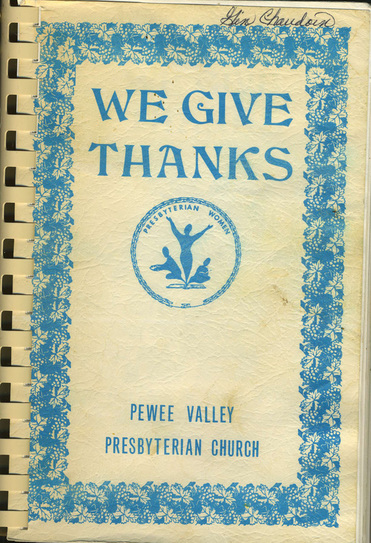 Courtesy of the late Virginia Herdt "Gin" Chaudoin, Pewee Valley Town Historian.
Courtesy of the late Virginia Herdt "Gin" Chaudoin, Pewee Valley Town Historian.
The church also published and sold a cookbook at one time called, “We Give Thanks,” that was dedicated to the memories of Mrs. Anna Rose Hall, Mrs. Elizabeth Cleaver and Miss Betsy Haskins. The cookbook included a section called “Pewee Valley Memories,” written by Miss Iris Haskins, which combined both “Little Colonel” lore with reminiscences of notable repasts prepared by the Ladies Aid society:
“Welcome to the ‘Cookbook”, compiled by our Women of the Church. Many of these recipes are handed down by the descendants of the former Ladies Aids of the Pewee Valley Presbyterian Church. These ladies were people featured in Little Colonel Stories by Mrs. Annie Fellows Johnston.
“Some of the ladies were: Mrs. Fanny Craig who was ‘Aunt Allison’ in the ‘Stories’. Mrs. Louise Cleland, known as ‘Miss Cleling’ taught music at Lloydsboro Seminary, where the Little Colonel (Hattie Cochran Dick) and others went to school. Mrs. Annie Fellows Johnston and her daughter, Miss Jamie Johnston, were also included in the stories. Miss Kate Matthews was ‘Miss Marks’ in the ‘Stories’ (she took pictures in the Colonel books). Miss Mamie Cleland (daughter of Mrs. Louise Cleland) was loved by young and old in the church. Mrs. McCauhey was an active member of the Ladies Aid. Mrs. Lawton, who was Mrs. Walton in the ‘Stories’, was the mother of Allison and Kitty Walton who were two of the main characters in the ‘Stories’. Miss Emma McDowell was the seamstress.
“Each spring and fall, Miss Emma McDowell went to homes to sew for the season. She would bring her cow to pasture in the yard and stay weeks until she finished sewing.
“Welcome to the ‘Cookbook”, compiled by our Women of the Church. Many of these recipes are handed down by the descendants of the former Ladies Aids of the Pewee Valley Presbyterian Church. These ladies were people featured in Little Colonel Stories by Mrs. Annie Fellows Johnston.
“Some of the ladies were: Mrs. Fanny Craig who was ‘Aunt Allison’ in the ‘Stories’. Mrs. Louise Cleland, known as ‘Miss Cleling’ taught music at Lloydsboro Seminary, where the Little Colonel (Hattie Cochran Dick) and others went to school. Mrs. Annie Fellows Johnston and her daughter, Miss Jamie Johnston, were also included in the stories. Miss Kate Matthews was ‘Miss Marks’ in the ‘Stories’ (she took pictures in the Colonel books). Miss Mamie Cleland (daughter of Mrs. Louise Cleland) was loved by young and old in the church. Mrs. McCauhey was an active member of the Ladies Aid. Mrs. Lawton, who was Mrs. Walton in the ‘Stories’, was the mother of Allison and Kitty Walton who were two of the main characters in the ‘Stories’. Miss Emma McDowell was the seamstress.
“Each spring and fall, Miss Emma McDowell went to homes to sew for the season. She would bring her cow to pasture in the yard and stay weeks until she finished sewing.
“One fall, the Little Colonel (Hattie Cochran Dick) stayed at the Lloydsboro Seminary while her parents were away. ‘Mom Beck’, the famous and faithful maid, took the clean washing to the Seminary for the Little Colonel every Saturday. One Saturday, she took a picnic basket for the Little Colonel and her friends. As the Little Colonel spied the basket, she cried with joy, ‘What have you in the basket?’ The maid replied, ‘Honey Chile, I have some of Mrs. Joy’s ‘Jelly Cookies’ and Miss Florence’s ‘Olive-Cheese-and-Nut’ sandwiches.” (Editor’s note: Mrs. Joy and Miss Florence were Kate Matthews’s sisters.)
“The spring meeting of the Presbyterial came to the Pewee Valley Presbyterian Church for their annual meeting. All the Ladies Aids were summoned for this occasion. The main dish for the luncheon was ‘Chicken Salad’ – quite a formal affair. It had to made just right to keep the reputation of the Ladies Aids up to their chicken salad standard. Mrs. William Herdt made her famous ‘Timbal Mould’ containing peas, Anna Rose Hall made her ‘mouth-watering rolls and Mrs. Barlie and some of the other ladies brought their famous cakes.
“When the Ladies Aids served the dinners to the Faculty and students of the Presbyterian Seminary, the main meat dish was ‘Chicken Rosemary’, made by Betsy Haskins.
“Pewee Valley was famous for its grapes. Everyone had a grape arbor in their yard. At social events, grape juice (homemade) was served. Strawberries were also very popular with most people. A big bowl of strawberries with a bowl of sugar near was usually on the breakfast table.
“In the Little Colonel book, Hattie Cochran Dick was portrayed as ‘Lloyd Sherman’. It is written that at the age of four, playing with her dog, they passed the neighbor’s strawberry patch and the ‘Little Colonel’ looked up, sniffed, and exclaimed, ‘Um!! Fritz, I smell ‘twaw-berries!’”
“The spring meeting of the Presbyterial came to the Pewee Valley Presbyterian Church for their annual meeting. All the Ladies Aids were summoned for this occasion. The main dish for the luncheon was ‘Chicken Salad’ – quite a formal affair. It had to made just right to keep the reputation of the Ladies Aids up to their chicken salad standard. Mrs. William Herdt made her famous ‘Timbal Mould’ containing peas, Anna Rose Hall made her ‘mouth-watering rolls and Mrs. Barlie and some of the other ladies brought their famous cakes.
“When the Ladies Aids served the dinners to the Faculty and students of the Presbyterian Seminary, the main meat dish was ‘Chicken Rosemary’, made by Betsy Haskins.
“Pewee Valley was famous for its grapes. Everyone had a grape arbor in their yard. At social events, grape juice (homemade) was served. Strawberries were also very popular with most people. A big bowl of strawberries with a bowl of sugar near was usually on the breakfast table.
“In the Little Colonel book, Hattie Cochran Dick was portrayed as ‘Lloyd Sherman’. It is written that at the age of four, playing with her dog, they passed the neighbor’s strawberry patch and the ‘Little Colonel’ looked up, sniffed, and exclaimed, ‘Um!! Fritz, I smell ‘twaw-berries!’”
Views of Pewee Valley Presbyterian Church Through the Years
Related Links
Reminiscences of Iris Haskins: Christmas in Pewee Valley
The United Presbyterian Church in Pewee Valley: 1866-1966
"Mrs. Annie Fellows Johnston's Real People" Picture Folio
Kentucky Heritage Council File on the Manse on Maple Avenue
George Metz House
Mary Cleland House
Kate Matthews
Judge Peter B. Muir
Sunnyside-Edgewood
The Family of General Henry Ware Lawton
Annie Fellows Johnston
Mary Gardner Johnston
Bemersyde
The Little Colonel Website
The United Presbyterian Church in Pewee Valley: 1866-1966
"Mrs. Annie Fellows Johnston's Real People" Picture Folio
Kentucky Heritage Council File on the Manse on Maple Avenue
George Metz House
Mary Cleland House
Kate Matthews
Judge Peter B. Muir
Sunnyside-Edgewood
The Family of General Henry Ware Lawton
Annie Fellows Johnston
Mary Gardner Johnston
Bemersyde
The Little Colonel Website

